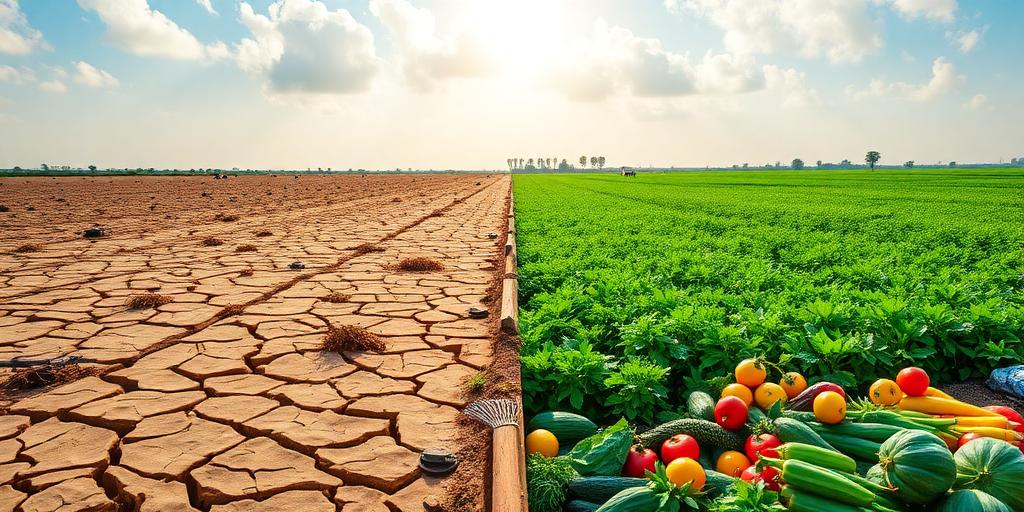India's agriculture sector stands as the backbone of its economy, employing a significant portion of the population and contributing substantially to the national GDP. However, this vital sector navigates a complex landscape marked by inherent challenges and burgeoning opportunities. Understanding these dynamics is crucial for sustainable growth and ensuring food security for the nation's burgeoning population. This article delves into the critical factors shaping the future of Indian agriculture.
The Enduring Challenges in Indian Agriculture
India's agricultural landscape is characterized by several persistent issues that impede its full potential. One of the primary challenges in Indian farming is its heavy reliance on monsoon rains, making it vulnerable to climate change and unpredictable weather patterns. Droughts and floods regularly devastate crops, leading to significant financial losses for farmers.
Furthermore, fragmented land holdings are a widespread concern. The average farm size in India is small and diminishing, hindering the adoption of modern, large-scale farming techniques and mechanization. This fragmentation also complicates the implementation of efficient irrigation systems and infrastructure development.
Access to adequate infrastructure, including storage and cold chain facilities, remains a significant bottleneck. A substantial portion of agricultural produce perishes post-harvest due to a lack of proper storage, leading to wastage and reduced farmer income. Similarly, limited access to timely and affordable credit and efficient market linkages leaves many farmers at the mercy of intermediaries, diminishing their bargaining power and profits.
Finally, low agricultural productivity compared to global benchmarks is another critical issue. This is often a result of outdated farming practices, insufficient use of high-quality seeds, limited access to modern farm machinery, and a lack of scientific knowledge dissemination among farmers.
Emerging Opportunities for Indian Farmers
Despite the formidable challenges, India's agriculture sector is ripe with opportunities that, if strategically harnessed, can transform its future. One of the most promising avenues lies in technological innovation. The adoption of precision farming techniques, powered by AI, drones, and IoT sensors, offers the potential to optimize resource utilization, monitor crop health, and enhance yields. Modernizing Indian agriculture through such advancements can lead to significant gains in efficiency and productivity.
Value addition and food processing represent a vast untapped market. By processing raw agricultural produce into higher-value products, farmers can significantly increase their income and reduce post-harvest losses. Government incentives and private investments in this sector are creating new avenues for growth and employment.
The increasing demand for agricultural products globally presents substantial export opportunities for Indian farmers. With diverse climatic zones, India can produce a wide array of crops. Focusing on quality standards and market-specific demands can unlock lucrative international markets.
Diversification into high-value crops such as horticulture, organic farming, and medicinal plants offers an escape from the traditional crop cycle's vagaries. These crops often fetch better prices and can be more resilient to certain climatic conditions. Sustainable agriculture India practices are also gaining traction, driven by environmental concerns and consumer preferences.
Moreover, the Indian government has initiated various policy supports and reforms aimed at addressing the sector's challenges. These include schemes for irrigation, credit, market access, and crop insurance, all designed to create a more supportive ecosystem for agricultural growth.
The Path Forward for Sustainable Agricultural Growth
India's agriculture sector stands at a pivotal juncture. While the challenges are profound, the opportunities for growth and transformation are equally significant. A concerted effort involving government policy, private investment, technological adoption, and farmer education is essential to unlock the sector's full potential. By focusing on sustainable practices, integrating technology, and enhancing market access, India can ensure a prosperous and secure future for its millions of farmers and its entire population. The journey toward a more robust, resilient, and equitable agricultural system requires strategic vision and collaborative action.









